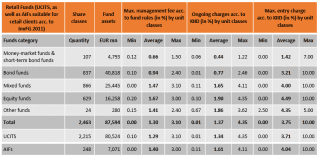Austrian investment funds (in accordance with the Investment Funds Act 2011 (InvFG 2011; Investmentfondsgesetz 2011)) and alternative investment funds suitable for retail investors (in accordance with the Alternative Investment Fund Managers Act (AIFMG; Alternative Investmentfonds Manager-Gesetz) have broadly spread fee structures, although the fees are consistent within the respective commercial funds categories as well as the risk classes. Furthermore, there are also no significantly discernible differences to the structure of the German market. These were the findings of the analysis conducted by the Austrian Financial Market Authority (FMA) for the first time for 2016 about a total of 2,463 fund share classes representing fund assets totalling € 87.6 billion, relating to the maximum annual management fees in accordance with the fund regulations as well as the ongoing charges in accordance with the Key Investor Information Document (KIID).
In 2016 according to the fund regulations the maximum annual management charge across all fund categories was on average 1.30% (mean), with the range of actual values being between 0% and 3.1%. The annual ongoing charges according to the KIID stood on average at 1.37%, although the individual range stood at between 0.01% and 4.35%. The maximum entry charge according to KIIDs across all share classes was 3.75% on average, although in this case it ranged from 0.00% to 10.00%. It is also significant that the fees increase consequently in line with the risk classification of the fund, measured in terms of the Synthetic Risk and Rewards Indicator (SRRI), with this being the case both in terms of the maximum management fees (with an average of between 0.76% and 1.74% per risk class), as well as in terms of the ongoing charges (with an average of between 0.37% and 1.93% per risk class) as well as the maximum issue premium (with an average of between 1.19% any 4.71% per risk class). The fees are lowest for money-market funds and short-term bond funds, increasing across bond funds, mixed funds to equity funds.
“The FMA’s new market study, which will appear annually in the future, provides a significant contribution towards improving market transparency for investors. Investors are now in a better position to the compare and assess the charges and management fees within a single category of funds as well as between different categories of funds”, remarked the FMA Executive Board, Helmut Ettl and Klaus Kumpfmüller.
The maximum management fee is stated in the fund regulations as the highest permissible annual percentage, that the management company shall be allowed to deduct from the assets of the fund for fund management. This amount, however, as a rule covers most but not all costs, since custodian fees, entry charges, exit charges, transactions costs, other performance-related management charges or additional costs may also be incurred.
The actually occurring costs of the fund during a year as a percentage of the assets of the fund are expressed as the ongoing charges in accordance with the KIID; they may therefore fluctuate from one year to the next. The ongoing charges contain all types of costs that the fund has to bear, regardless of whether they are ongoing charges or the remuneration of persons providing services for the fund. The components of the ongoing charges consist of management fees, custodian banks fees, fees for investment advisors, all payments that may be incurred as a result of outsourcing, registration fees, supervision fees or similar fees, remuneration of statutory auditors, remuneration for legal and business advisors as well as any distribution fees. Costs that are not taken into consideration as running costs include entry and exit charges, brokerage commission as well as performance-related management fees.
The maximum entry charge is the highest amount for a one-off fee that occurs when purchasing shares in a fund. The entry charge serves various purposes including covering distributions costs, and varies depending on the type of fund and share class. Different brokers frequently offer various types of discounts on the entry charges.
Journalists may address further enquiries to:
Tiemon Kiesenhofer
+43/(0)1/24959-6010
+43/(0)676/882 49 610
